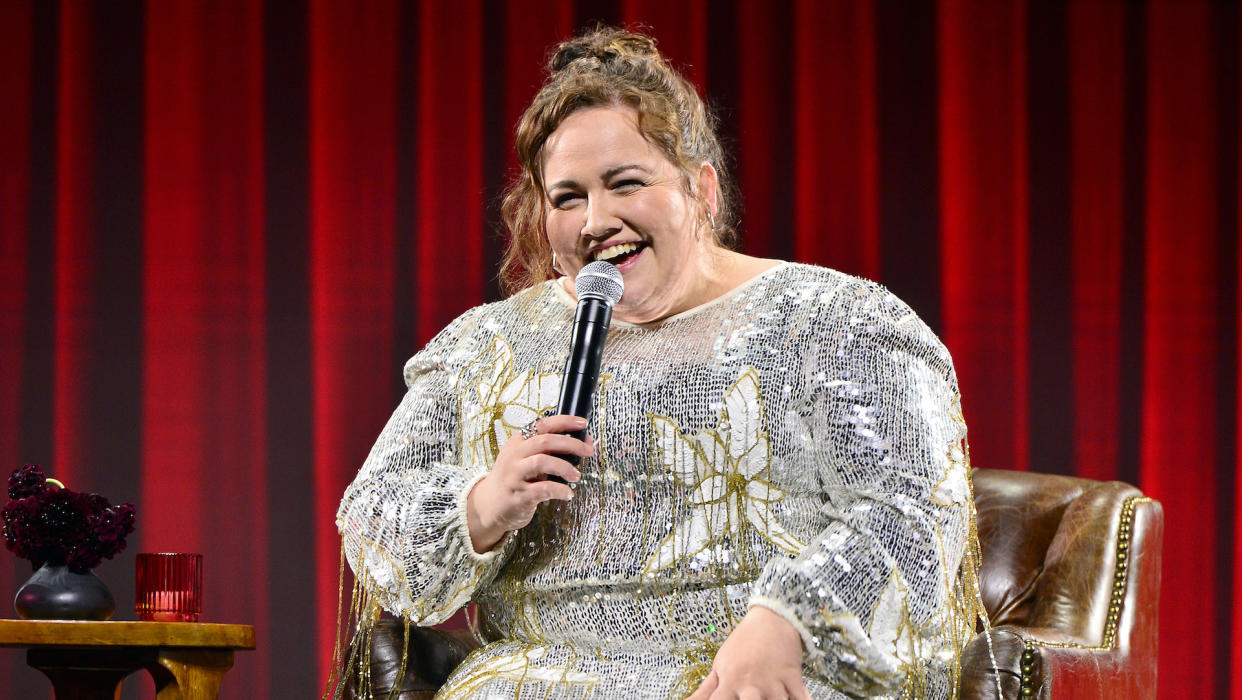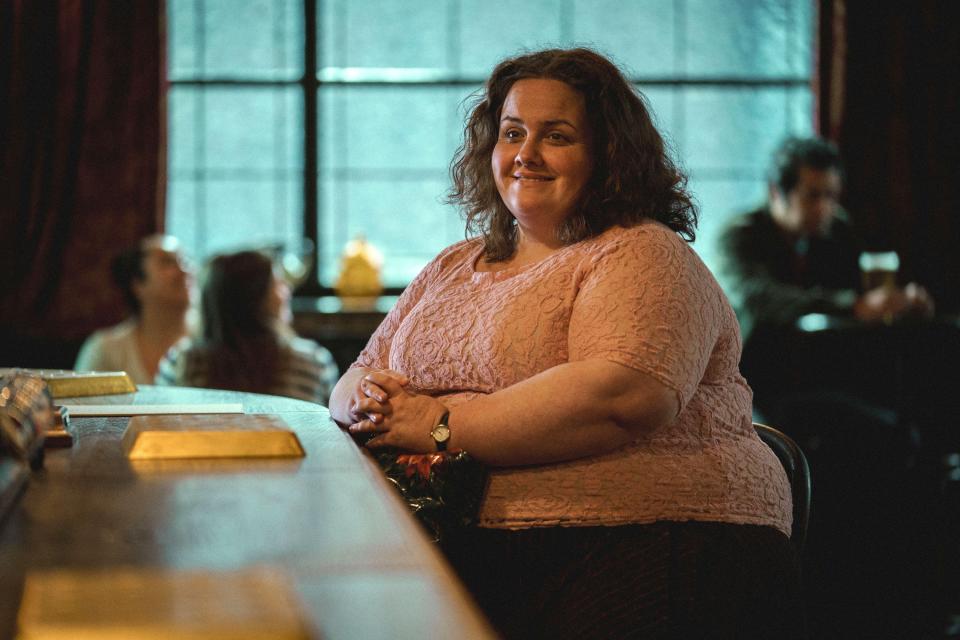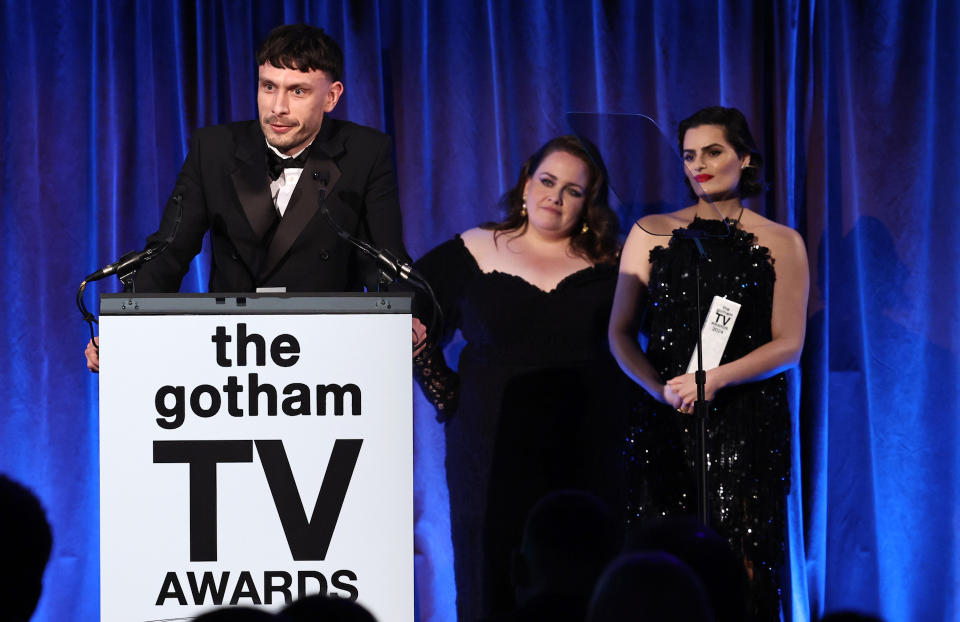For Jessica Gunning, ‘Baby Reindeer’ Is Part of the ‘Interesting Map’ of a Long Career


Jessica Gunning remembers the first time she made someone laugh.
“It was in a classroom,” she told IndieWire, over breakfast in SoHo while making the rounds for Netflix’s “Baby Reindeer.” “I was just doing a scene in a drama class, and then everyone, for some reason, laughed, and I got such a buzz from that. I was like, ‘Oh my God, that’s the best feeling ever.’”
More from IndieWire
Born and raised in Yorkshire, in Northern England, Gunning chased that feeling down to London to attend drama school, never disabused of the notion that she could and should be a professional performer.
“I’d always just thought I could be an actor, which is rare, but I just loved the thought of it,” she said.
Gunning has been hard at work for 17 years since then, appearing in short films, features, television, and more. “Baby Reindeer” is hardly a formulaic global smash hit; Richard Gadd’s series which started as a one-man show depicts his real-life ordeal with stalking, sexual assault, and processing those experiences, with Gunning starring as his stalker, Martha. She knew the show was special when she read it, but couldn’t have imagined its reach.
“Baby Reindeer” swiftly entered Netflix’s Top 10 in multiple countries; by June, it entered the all-time Top 10 list, tracking shows which have the most-viewed first 91 days of streaming. The night before our interview, Gunning and I met in person at the Gotham TV Awards, her first awards show outing with “Baby Reindeer,” where it won Breakthrough Limited Series. One of the night’s highlights for Gunning was meeting Kristen Wiig, whose “Confessions of a Tooth Fairy” Groundlings sketch is one of her favorites, and debuted right around when Gunning graduated.
Maybe it’s full circle moments like that which have Gunning thinking lately about her 16-year-old self.
“Sometimes I like playing this game in my head, imagining the little me seeing life, or little snippets from certain things,” she said. “The fact that I’m still acting, the opportunities I’ve had, and the people I’ve got to meet.”
Around that age, when Gunning was in drama school, one of the alumni returned to speak to her year. “We had somebody come back who was a bit pessimistic, and kind of said, ‘You’ll be lucky in 10 years if one of you is even acting.’ Sadly, that statistically is kind of true, but I don’t know how helpful it is to tell graduating students that.”
Now a fellow of the school, Gunning herself goes back to speak to the third years, reminding them to look at the career trajectories of actors they admire, almost none of whom graduated into overnight success.
“Not to be too cheesy, but the point of acting is to mirror real life and try and find human stories to tell, and do your best interpretation of being what it is to be human,” she said. “If you’re not living your life, if you’re just waiting to work, waiting for the next job, waiting for the next audition, I think you miss a really important bit of it — falling in love or traveling or being with friends and reading, seeing theater. I think it’s really important to remind students of that as well.”
Gunning might well be one of those actors now who comes to mind when the students search for a slow-burning breakout. But her outlook hasn’t changed, and she’s just delighted to be working.
“I’ve said before, and I genuinely do mean this: if I never work again, I get to say that I played Martha in ‘Baby Reindeer,’” Gunning said proudly. “I’m so proud of that, so I never, ever use it as a platform, I never want to be famous or anything like that. I just want to work, I love it so much. I’m such a geek.”
A bit of fame, it seems, is not only forthcoming but has already arrived. Of late, Gunning has described fan encounters in the wild, including one woman who cried out at the sight of her after finishing Episode 7 (“I understand why she did, in her defense”). At a toddler’s birthday in a beer garden, she ordered coffee that came in a cup and saucer, and “as I was taking it to the garden about 10 different people were like ‘Was that cup of tea on the house?”

And while she’s been recognized on the street before — she recounts a mortifying experience where she listed her whole filmography, only to learn that the she went to school with the woman’s son — it’s different with Martha. At the airport recently, someone identified her from “that ‘Reindeer’ show,” and then “went philosophical,” as Gunning recalls.
“He said, ‘We’re all little bit Martha. I remember falling [in love], filling in gaps that weren’t there, and I really connected to it.’ I was quite emotional,” she said.
Like “Baby Reindeer” itself, Martha did not spring into being overnight. It took years of Gadd unpacking his true experience with the stalker she’s based on, then Gunning and the show’s directors all coming in and adding to her. Existing inspirations for Gunning included “Misery” and Robert DeNiro’s “King of Comedy,” which led her to research the concept of limerence: a state of obsession with another person that goes beyond love or infatuation — almost an obsession with obsession.
“I think if I was to draw a stalker or write a stalker, I would assume whenever they interacted with the person that they were obsessed with, they would always be really gushy and praising and in awe of that person,” Gunning said. “When [Martha] says ‘Your comedy is a bit shy, actually,’ you’d think she would think he’s the best comedian ever, but … the familiarity she had with him was even more unusual for me, because in her mind, she knew him better than anyone. They’re meant to be.”
With limerence, Gunning probed further into the idea that Martha would inflate and embellish all her interactions with Donny, that she’d imagine a thousand different scenarios between them that felt as existent as the real thing.
“[What’s] so beautiful, actually, about Martha and Donny’s relationship, is that he was even better than her imagination,” Gunning said. “That scene in the cafe where he says, ‘Do you know what you want? And I say, ‘Well, I want the Scotch broth, but I don’t know if it’s on the menu or not.’ I imagined her practicing that the night before, and then in her narrative, filling in what he might say. But in real life, he says, ‘No, it’s not available. It’s actually on specials.’ So that’s even better than she would have even imagined.”

During the hour or so that we spend together, Gunning provides a smattering of lively anecdotes, starting with the memory of her first cover letter. She enclosed her headshot and resume to send out to reps, along with a letter that started with “BOO!”
“Genuinely, in the core of me, I thought this would be a good way to introduce myself,” she said with a laugh. “‘BOO. Sorry if that scared you, just wanted to introduce myself. I’m a Northern actress, from…’ It’s embarrassing how many people I sent that to.”
But it worked. The very next day, Gunning heard back from two casting directors, including the prolific Fiona Weir. The jump-scare cover letter didn’t get Gunning a job, but Weir found it funny and asked her to keep in touch, eventually thinking of Gunning down the line when she cast Matthew Warchus’s “Pride.” The film just celebrated its 10-year anniversary, and remains one of the projects closest to Gunning’s heart.
“Pride” acquainted Gunning with being part of something that resonated strongly with its audience; after debuting in Toronto that year, Gunning recalls standing ovations every time she saw it with a crowd. She also likes looking back at jobs she didn’t get; “There’s an interesting kind of map of a career, and map of a life,” she said of the various pieces. “Pride” included Imelda Staunton and fellow Gotham nominee Andrew Scott; the miniseries “White Heat,” featured a friend group that included Claire Foy and Sam Claflin. On “The Outlaws,” Gunning got to try her hand at writing along with creator Stephen Merchant.
“The most daunting day ever in my life is probably having to send an email to Stephen Merchant going ‘Hey, Stephen, here’s my first draft of the script,’ send,” she said with a nervous sound effect. It’s part of a broader interest in directing, producing — collaborating in general.
“Whenever I’m on set, I’m just there all the time, I’m watching at the monitors,” she said. I’m a bit of a geek in terms of being on set and watching how everything’s done and watching by the monitors and just learning how to tell a story properly.”
Telling a resonant story still drives Gunning, all these years after her classmates laughed at a scene. With interview requests and public appearances piling up, I asked Gunning what she wishes she could talk about, and her answer reminded me of what she shares with the students at her drama school.
“I think that sometimes art or theater or film or TV can be seen as — not trivial, but like something that we can take or leave,” Gunning said. “But I actually think that it’s integral to living a good life. In times when people struggle, they turn to entertainment to either make them escape or laugh, which is why so many shows were binged during the pandemic … it can unify people. Me and my mum and my sister will live in different places, and one thing that bonds together is watching the same show at the same time so we can talk about it.”
“Everywhere you go, you can hear people talk about shows that they’re binge watching, or music they love, or books they’ve read,” she added. “You do this job to entertain, but every so often, something comes along where you’re just like, ‘This might be changing someone’s life.’”
“Baby Reindeer” is now streaming on Netflix.
Best of IndieWire
Sign up for Indiewire's Newsletter. For the latest news, follow us on Facebook, Twitter, and Instagram.